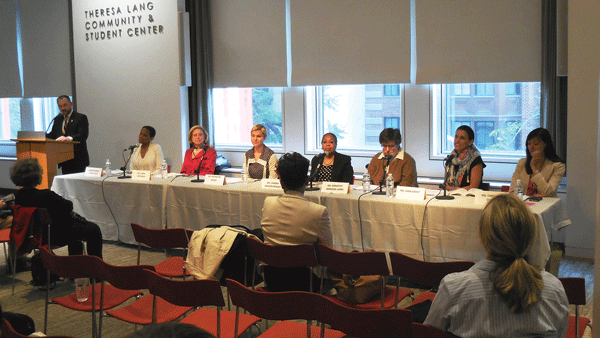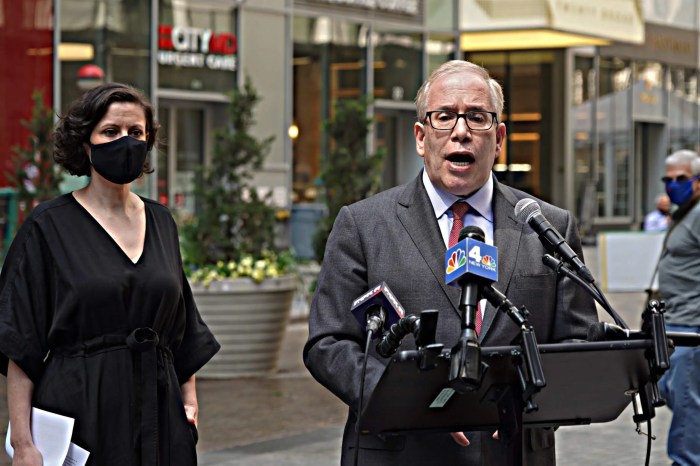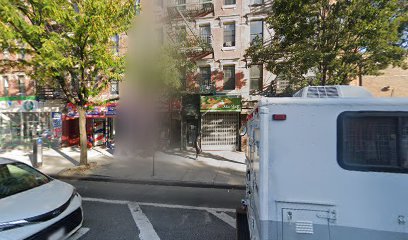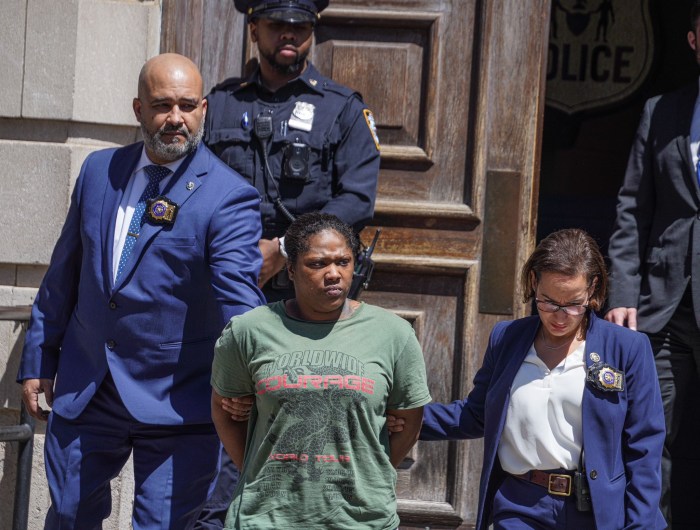
At May 29’s inaugural edition of his “Let’s Talk” series, City Councilmember Corey Johnson and seven panelists discuss work being done in the areas of domestic violence, the workplace, healthcare and reproductive rights, social services, and housing for seniors.
BY EILEEN STUKANE | The first of City Councilmember Corey Johnson’s series of themed evenings debuted last week at The New School Student Center on W. 13th St. “Let’s Talk” hopes to generate conversation between leaders in specific fields and New Yorkers who usually do not have the opportunity to interact with them.
The focus of May 29’s inaugural edition — “Women’s Issues, The Empowerment of Women” — brought together a panel of seven accomplished women to discuss work that is being done in the areas of domestic violence, the workplace, healthcare and reproductive rights, social services, and housing for seniors. The panel included Rosemonde Pierre-Louis, Commissioner of the Mayor’s Office to Combat Domestic Violence; Linda Hoffman, president, New York Foundation for Senior Citizens; Katharine Bodde, attorney with the New York Civil Liberties Union (NYCLU); Sandra Jackson Berger, president, Global Association of Women for the Arts; Dorothy Johnson Laird, social services coordinator, Hudson Guild Senior Center; Dina Bakst, co-founder/co-president, A Better Balance: The Work & Family Legal Center; and Christina Chang, vice-president of public affairs, Planned Parenthood of New York City.
As each woman explained her area of expertise and presented information on the work that is being done by her organization, it became clear that many are striving to prevent women and their families from slipping through the cracks of urban life. Options for support are open to women who know where to look for them, and this evening was designed as a roadmap. There is a 10-point Women’s Equality Act that has twice passed the New York State Assembly, but has not been voted into law by the New York State Senate because certain Senators cannot agree on one point: “Protect A Woman’s Freedom of Choice,” a reproductive rights issue. City and private organizations have therefore stepped in to fight issues of discrimination that are not being addressed as all 10 points remain in limbo.
Speaking with Chelsea Now after the debut of “Let’s Talk,” Councilmember Johnson explained, “We had a very successful [District 3] Town Hall meeting in March, and people responded well — but they were craving more information — not just on municipal government, but on services. The wonderful people I work with felt we should create this series and I thought it was a great idea.”
A number of panel members mentioned that this was the first time an elected official had created such a forum. Some of them were meeting each other for the first time and networking.
Citing a stunning statistic — 280,000 domestic-incident reports filed in NYC during 2013 — Commissioner Pierre-Louis contextualized domestic violence as a thread going through countless lives, and said she wants to cut that thread early by teaching young people how to have a healthy relationship. To that end, peer educators from the NYC Healthy Relationship Training travel to various organizations throughout the city to give relationship training to young people and parents. This program will soon expand to include sexual assault and the issue of consent. The Commissioner offered anyone interested a tour of the recently opened NYC Family Justice Center, at 80 Centre St. Co-located with the District Attorney’s Office, it makes both legal and social services available to victims of domestic violence, all under one roof. For info, call 212-602-2800 or 1-800-621-4673.
Both attorneys, Katharine Bodde for the NYCLU and Dina Bakst of A Better Balance, a legal advocacy group dedicated to promoting fairness in the workplace, welcomed those who have conflicts at work to contact them. Bodde and Bakst focused on the fact that the United States is the only industrialized country that does not offer paid family leave insurance when a new child comes into a family, or when a family member is sick and needs care. A paid family leave law is their goal.
“Without a paid family leave system, I think we’re in the company of Swaziland and Papua New Guinea,” said Bodde. The good news from Bakst was that on May 30, NYC’s Pregnant Workers Fairness Act was going into effect, and now reasonable accommodations must be made for workers with needs related to pregnancy, childbirth and related medical conditions. “It means that a retail worker who is 16 weeks pregnant and faints on the job because her employer doesn’t let her drink water on the job is now entitled to accommodation, and yes, that is a true story,” said Bakst. If you have workplace issues, the hotline for free legal counseling from A Better Balance is 212-430-5982.
Bodde, as well as Christina Chang of Planned Parenthood, alerted the audience to the “Crisis Pregnancy Centers” (CPCs) located very close to Planned Parenthood Centers. Bodde is working to pass a law requiring the CPCs to disclose that they are not medical facilities — although they appear to be so, and often provide inaccurate information that is meant to scare people away from accessing abortion care. The CPCs, according to Chang, “potentially mislead people from having access to a range of options that they might be looking for.” She announced that Planned Parenthood’s new tagline, which appears under their logo, is “Care No Matter What,” which sums up the organization’s philosophy. “We provide care regardless of your immigration status, gender identity, and ability to pay. Our doors are open and our care is private and nonjudgmental,” she said.
Options for older women were presented by Linda Hoffman of the New York Foundation for Senior Citizens and Dorothy Johnson Laird of the Hudson Guild Senior Center in Chelsea. Hoffman’s not-for-profit organization encompasses 30 social service programs and 10 buildings for senior housing. It is also overseeing an innovative program called “Home Sharing,” which matches people over age 60 as either a guest or a host (if one has an unused bedroom and bath) to share living space and a certain amount of rent with another person.
“We have a professional staff who carefully, comprehensively, and closely screen for potential hosts and guests using a computer program called Quick Match, and then the social worker comes in to assess personalities,” says Hoffman, who sees Home Sharing as another way of looking at affordable housing. A Home Sharing pilot program to match families with children and seniors is under way under the auspices of Deputy Mayor Lilliam Barrios-Paoli. In conjunction with the NYC Dept. of the Aging, Hoffman also spoke of the Community Arranged Resident Transportation (CART) Project, which provides free van transportation services (with wheelchair facility) for elderly travel through Community Boards 1 through 8.
Johnson Laird announced that, along with the many services Hudson Guild Center already offers, it now has free financial coaching available every Tuesday from 10 a.m. to 2 p.m. She said that the Center is seeing more “younger older people” — those under 70 years old, who have lost jobs, may be harassed by landlords, or are recently bereaved. “Our task is to try to help these women back on their feet emotionally and physically,” she said. The Center does an intake screening for financial concerns, depression, anxiety, and works to connect people to entitlements and resources, lawyers, healthcare specialists, therapists, and now, financial coaches. She told the story of a 66-year-old woman who had been laid off work and needed financial and resume counseling, and computer training to help her move forward. The Center helped her with all of that but she was reluctant to go on job interviews, since she felt she needed dental work to improve her appearance, and could not afford it. Johnson Laird was able to acquire a one-time funding grant for her from the Federation of Protestant Welfare Agencies, and her dental work was accomplished. Johnson Laird can be contacted in the Social Services Unit of Hudson Guild Center: 212-924-6710.
The availability of support for women, making it more broadly known, was a goal of “Let’s Talk” — and its success became clear during the Q&A session. A woman in the audience rose to say that she had an Ivy League education, a great career as a photographer, had photographed all over Africa, but was now living in poverty, on social security and food stamps. She is an artist and designer, but she lacked certain computer skills and could not get a job. “Young interviewers look at me and think ‘Mom,’ ” she said. She had a grant from Parsons to teach in the Dominican Republic, but the airfare was unaffordable.
Immediately, Johnson Laird said she had avenues for computer training and arranged to speak with her privately. Sandra Jackson Berger, who had spoken about women all over the globe empowering themselves through their art, offered to connect her with a photojournalist in California. “I was very moved by the woman who stood up and shared her current personal struggles to survive in New York City as an artist,” said Councilmember Johnson. “Then to have people there who can link her up with help, that was a special moment.”
Possibilities for future “Let’s Talk” topics are Affordable Housing as well as issues impacting LGBTQs and immigrants. To reach Councilmember Johnson’s office, call 212-564-7757 or visit council.nyc.gov/d3/html/members/home.shtml.

















